Taxation Law: Comprehensive Analysis of Logan's Tax Liabilities
VerifiedAdded on 2022/10/31
|11
|3342
|268
Homework Assignment
AI Summary
This assignment analyzes the taxation consequences for Logan, an air traffic controller, based on his income and financial transactions during a specific tax year. The analysis involves determining Logan's assessable income, which includes his salary, awards, and prizes, considering whether these are classified as ordinary or statutory income. The assignment also examines potential deductions, such as expenses related to his pilot's license and flight training, evaluating their eligibility under general deduction rules. The legal principles from cases like Scott & Ors v FC of T, FC of T v McNeil, and others are applied to determine the tax implications of Logan's various income sources and expenses, providing a comprehensive overview of his tax liabilities. The analysis also considers the tax treatment of awards and prizes received from both his community club and the Department of Aviation, as well as the implications of his townhouse purchase. The assignment concludes with a detailed assessment of Logan's taxable income, deductions, and overall tax obligations.
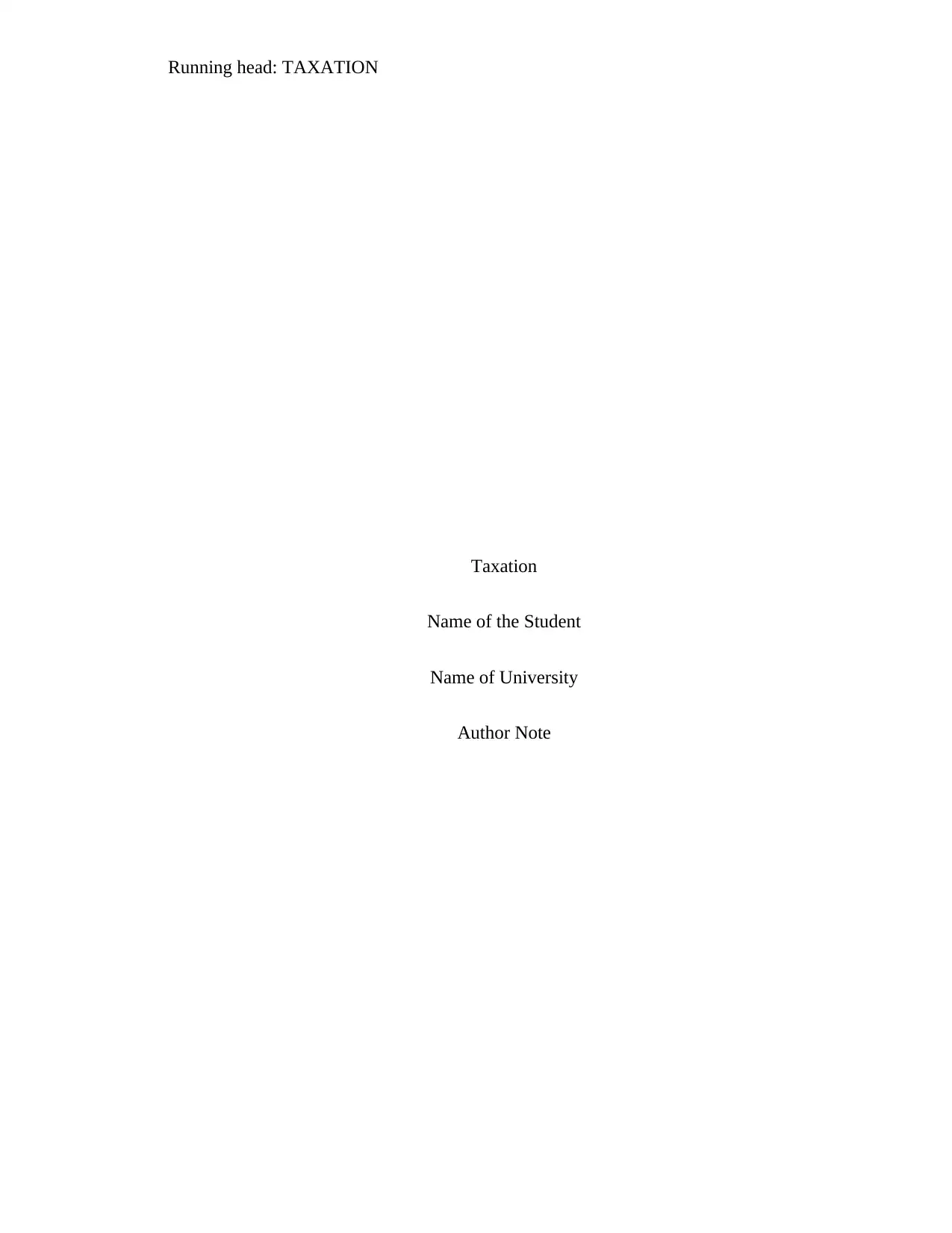
Running head: TAXATION
Taxation
Name of the Student
Name of University
Author Note
Taxation
Name of the Student
Name of University
Author Note
Paraphrase This Document
Need a fresh take? Get an instant paraphrase of this document with our AI Paraphraser
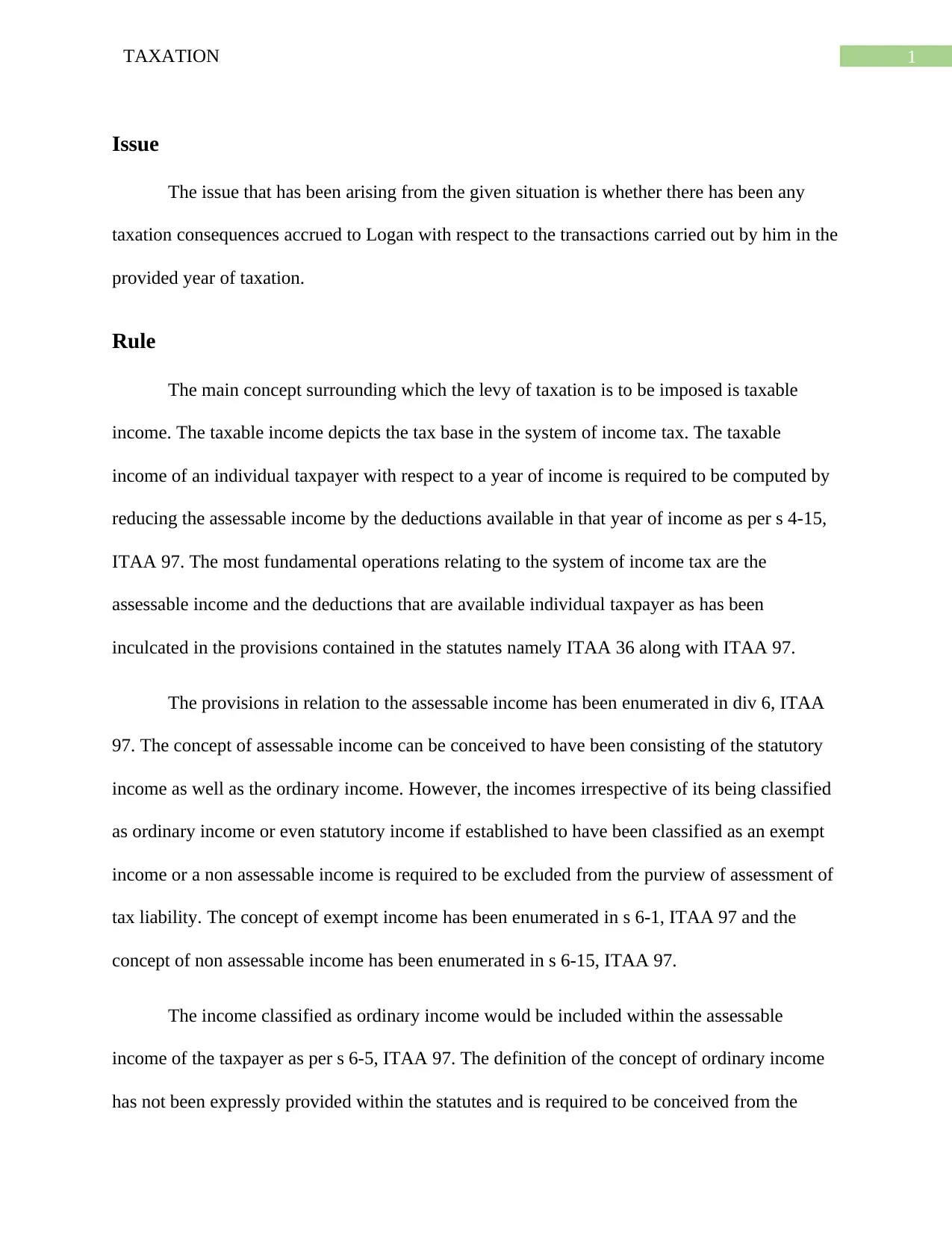
1TAXATION
Issue
The issue that has been arising from the given situation is whether there has been any
taxation consequences accrued to Logan with respect to the transactions carried out by him in the
provided year of taxation.
Rule
The main concept surrounding which the levy of taxation is to be imposed is taxable
income. The taxable income depicts the tax base in the system of income tax. The taxable
income of an individual taxpayer with respect to a year of income is required to be computed by
reducing the assessable income by the deductions available in that year of income as per s 4-15,
ITAA 97. The most fundamental operations relating to the system of income tax are the
assessable income and the deductions that are available individual taxpayer as has been
inculcated in the provisions contained in the statutes namely ITAA 36 along with ITAA 97.
The provisions in relation to the assessable income has been enumerated in div 6, ITAA
97. The concept of assessable income can be conceived to have been consisting of the statutory
income as well as the ordinary income. However, the incomes irrespective of its being classified
as ordinary income or even statutory income if established to have been classified as an exempt
income or a non assessable income is required to be excluded from the purview of assessment of
tax liability. The concept of exempt income has been enumerated in s 6-1, ITAA 97 and the
concept of non assessable income has been enumerated in s 6-15, ITAA 97.
The income classified as ordinary income would be included within the assessable
income of the taxpayer as per s 6-5, ITAA 97. The definition of the concept of ordinary income
has not been expressly provided within the statutes and is required to be conceived from the
Issue
The issue that has been arising from the given situation is whether there has been any
taxation consequences accrued to Logan with respect to the transactions carried out by him in the
provided year of taxation.
Rule
The main concept surrounding which the levy of taxation is to be imposed is taxable
income. The taxable income depicts the tax base in the system of income tax. The taxable
income of an individual taxpayer with respect to a year of income is required to be computed by
reducing the assessable income by the deductions available in that year of income as per s 4-15,
ITAA 97. The most fundamental operations relating to the system of income tax are the
assessable income and the deductions that are available individual taxpayer as has been
inculcated in the provisions contained in the statutes namely ITAA 36 along with ITAA 97.
The provisions in relation to the assessable income has been enumerated in div 6, ITAA
97. The concept of assessable income can be conceived to have been consisting of the statutory
income as well as the ordinary income. However, the incomes irrespective of its being classified
as ordinary income or even statutory income if established to have been classified as an exempt
income or a non assessable income is required to be excluded from the purview of assessment of
tax liability. The concept of exempt income has been enumerated in s 6-1, ITAA 97 and the
concept of non assessable income has been enumerated in s 6-15, ITAA 97.
The income classified as ordinary income would be included within the assessable
income of the taxpayer as per s 6-5, ITAA 97. The definition of the concept of ordinary income
has not been expressly provided within the statutes and is required to be conceived from the
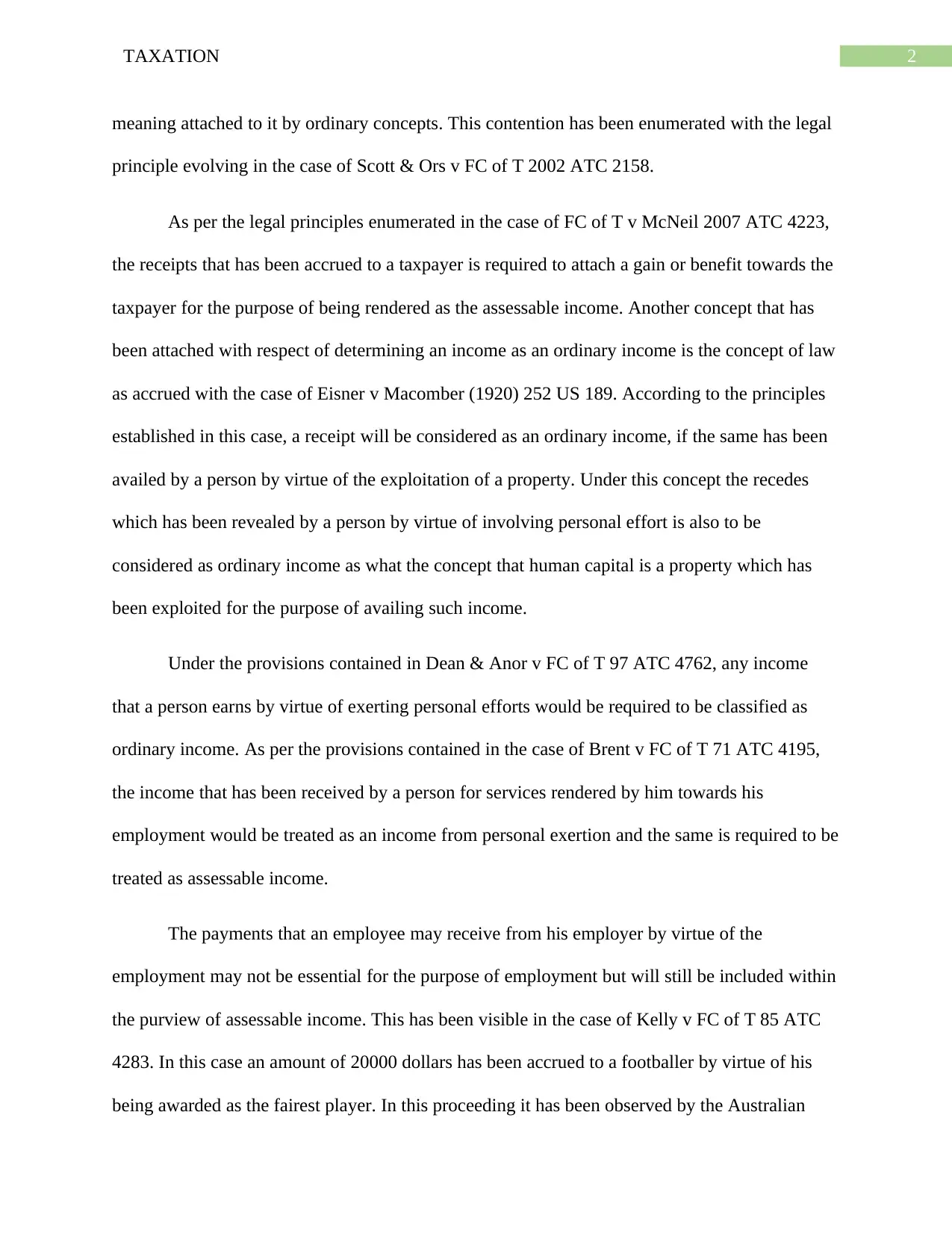
2TAXATION
meaning attached to it by ordinary concepts. This contention has been enumerated with the legal
principle evolving in the case of Scott & Ors v FC of T 2002 ATC 2158.
As per the legal principles enumerated in the case of FC of T v McNeil 2007 ATC 4223,
the receipts that has been accrued to a taxpayer is required to attach a gain or benefit towards the
taxpayer for the purpose of being rendered as the assessable income. Another concept that has
been attached with respect of determining an income as an ordinary income is the concept of law
as accrued with the case of Eisner v Macomber (1920) 252 US 189. According to the principles
established in this case, a receipt will be considered as an ordinary income, if the same has been
availed by a person by virtue of the exploitation of a property. Under this concept the recedes
which has been revealed by a person by virtue of involving personal effort is also to be
considered as ordinary income as what the concept that human capital is a property which has
been exploited for the purpose of availing such income.
Under the provisions contained in Dean & Anor v FC of T 97 ATC 4762, any income
that a person earns by virtue of exerting personal efforts would be required to be classified as
ordinary income. As per the provisions contained in the case of Brent v FC of T 71 ATC 4195,
the income that has been received by a person for services rendered by him towards his
employment would be treated as an income from personal exertion and the same is required to be
treated as assessable income.
The payments that an employee may receive from his employer by virtue of the
employment may not be essential for the purpose of employment but will still be included within
the purview of assessable income. This has been visible in the case of Kelly v FC of T 85 ATC
4283. In this case an amount of 20000 dollars has been accrued to a footballer by virtue of his
being awarded as the fairest player. In this proceeding it has been observed by the Australian
meaning attached to it by ordinary concepts. This contention has been enumerated with the legal
principle evolving in the case of Scott & Ors v FC of T 2002 ATC 2158.
As per the legal principles enumerated in the case of FC of T v McNeil 2007 ATC 4223,
the receipts that has been accrued to a taxpayer is required to attach a gain or benefit towards the
taxpayer for the purpose of being rendered as the assessable income. Another concept that has
been attached with respect of determining an income as an ordinary income is the concept of law
as accrued with the case of Eisner v Macomber (1920) 252 US 189. According to the principles
established in this case, a receipt will be considered as an ordinary income, if the same has been
availed by a person by virtue of the exploitation of a property. Under this concept the recedes
which has been revealed by a person by virtue of involving personal effort is also to be
considered as ordinary income as what the concept that human capital is a property which has
been exploited for the purpose of availing such income.
Under the provisions contained in Dean & Anor v FC of T 97 ATC 4762, any income
that a person earns by virtue of exerting personal efforts would be required to be classified as
ordinary income. As per the provisions contained in the case of Brent v FC of T 71 ATC 4195,
the income that has been received by a person for services rendered by him towards his
employment would be treated as an income from personal exertion and the same is required to be
treated as assessable income.
The payments that an employee may receive from his employer by virtue of the
employment may not be essential for the purpose of employment but will still be included within
the purview of assessable income. This has been visible in the case of Kelly v FC of T 85 ATC
4283. In this case an amount of 20000 dollars has been accrued to a footballer by virtue of his
being awarded as the fairest player. In this proceeding it has been observed by the Australian
⊘ This is a preview!⊘
Do you want full access?
Subscribe today to unlock all pages.

Trusted by 1+ million students worldwide
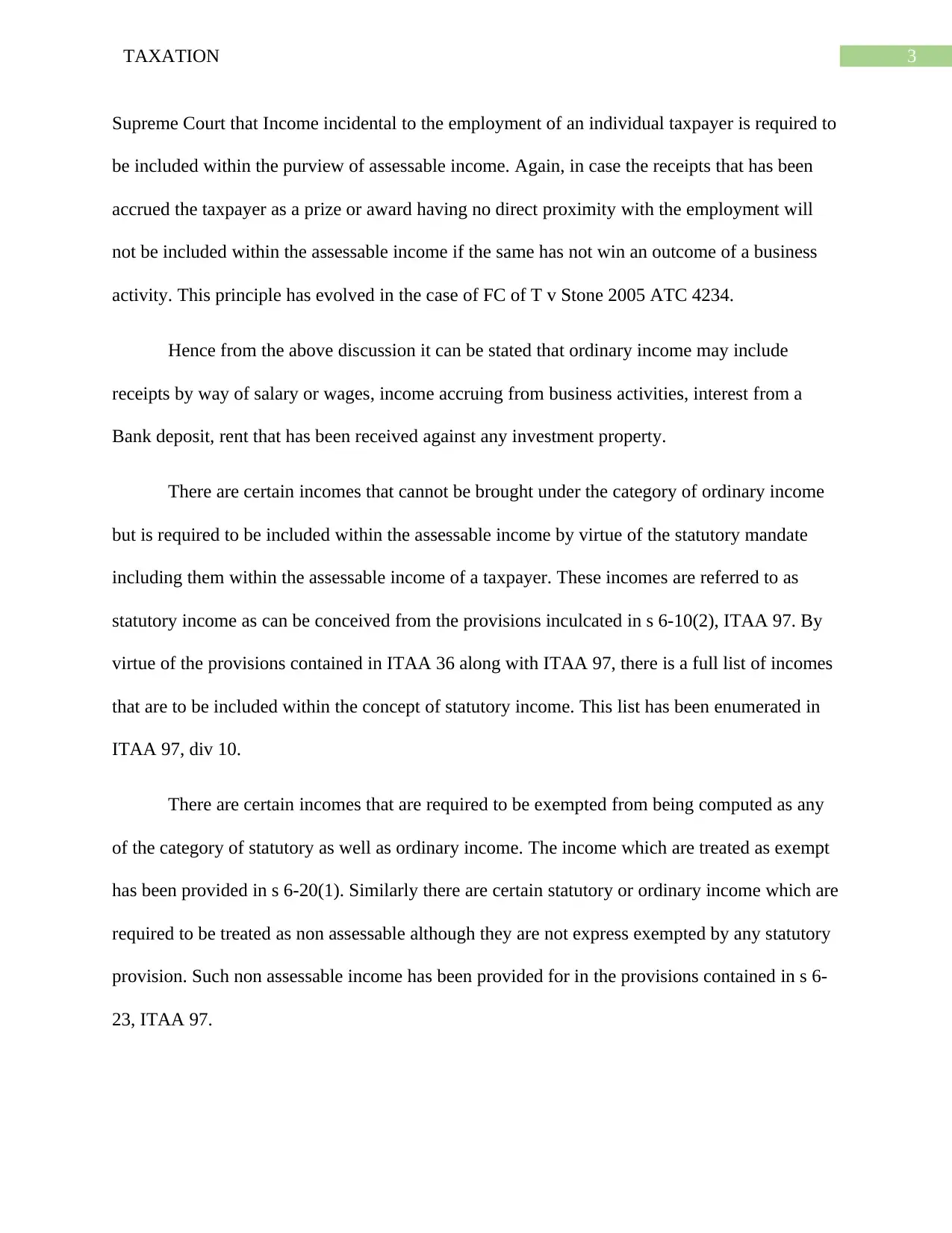
3TAXATION
Supreme Court that Income incidental to the employment of an individual taxpayer is required to
be included within the purview of assessable income. Again, in case the receipts that has been
accrued the taxpayer as a prize or award having no direct proximity with the employment will
not be included within the assessable income if the same has not win an outcome of a business
activity. This principle has evolved in the case of FC of T v Stone 2005 ATC 4234.
Hence from the above discussion it can be stated that ordinary income may include
receipts by way of salary or wages, income accruing from business activities, interest from a
Bank deposit, rent that has been received against any investment property.
There are certain incomes that cannot be brought under the category of ordinary income
but is required to be included within the assessable income by virtue of the statutory mandate
including them within the assessable income of a taxpayer. These incomes are referred to as
statutory income as can be conceived from the provisions inculcated in s 6-10(2), ITAA 97. By
virtue of the provisions contained in ITAA 36 along with ITAA 97, there is a full list of incomes
that are to be included within the concept of statutory income. This list has been enumerated in
ITAA 97, div 10.
There are certain incomes that are required to be exempted from being computed as any
of the category of statutory as well as ordinary income. The income which are treated as exempt
has been provided in s 6-20(1). Similarly there are certain statutory or ordinary income which are
required to be treated as non assessable although they are not express exempted by any statutory
provision. Such non assessable income has been provided for in the provisions contained in s 6-
23, ITAA 97.
Supreme Court that Income incidental to the employment of an individual taxpayer is required to
be included within the purview of assessable income. Again, in case the receipts that has been
accrued the taxpayer as a prize or award having no direct proximity with the employment will
not be included within the assessable income if the same has not win an outcome of a business
activity. This principle has evolved in the case of FC of T v Stone 2005 ATC 4234.
Hence from the above discussion it can be stated that ordinary income may include
receipts by way of salary or wages, income accruing from business activities, interest from a
Bank deposit, rent that has been received against any investment property.
There are certain incomes that cannot be brought under the category of ordinary income
but is required to be included within the assessable income by virtue of the statutory mandate
including them within the assessable income of a taxpayer. These incomes are referred to as
statutory income as can be conceived from the provisions inculcated in s 6-10(2), ITAA 97. By
virtue of the provisions contained in ITAA 36 along with ITAA 97, there is a full list of incomes
that are to be included within the concept of statutory income. This list has been enumerated in
ITAA 97, div 10.
There are certain incomes that are required to be exempted from being computed as any
of the category of statutory as well as ordinary income. The income which are treated as exempt
has been provided in s 6-20(1). Similarly there are certain statutory or ordinary income which are
required to be treated as non assessable although they are not express exempted by any statutory
provision. Such non assessable income has been provided for in the provisions contained in s 6-
23, ITAA 97.
Paraphrase This Document
Need a fresh take? Get an instant paraphrase of this document with our AI Paraphraser
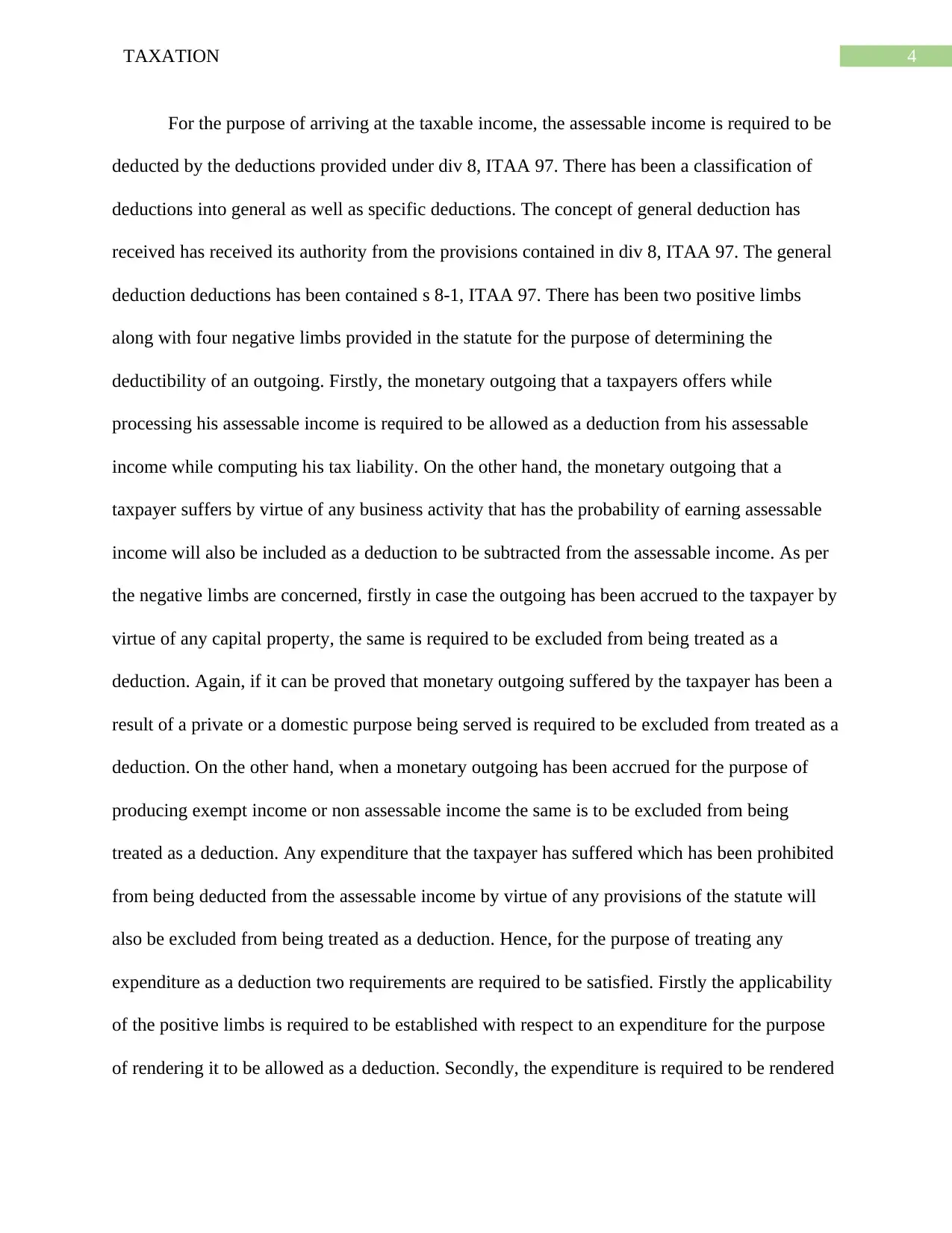
4TAXATION
For the purpose of arriving at the taxable income, the assessable income is required to be
deducted by the deductions provided under div 8, ITAA 97. There has been a classification of
deductions into general as well as specific deductions. The concept of general deduction has
received has received its authority from the provisions contained in div 8, ITAA 97. The general
deduction deductions has been contained s 8-1, ITAA 97. There has been two positive limbs
along with four negative limbs provided in the statute for the purpose of determining the
deductibility of an outgoing. Firstly, the monetary outgoing that a taxpayers offers while
processing his assessable income is required to be allowed as a deduction from his assessable
income while computing his tax liability. On the other hand, the monetary outgoing that a
taxpayer suffers by virtue of any business activity that has the probability of earning assessable
income will also be included as a deduction to be subtracted from the assessable income. As per
the negative limbs are concerned, firstly in case the outgoing has been accrued to the taxpayer by
virtue of any capital property, the same is required to be excluded from being treated as a
deduction. Again, if it can be proved that monetary outgoing suffered by the taxpayer has been a
result of a private or a domestic purpose being served is required to be excluded from treated as a
deduction. On the other hand, when a monetary outgoing has been accrued for the purpose of
producing exempt income or non assessable income the same is to be excluded from being
treated as a deduction. Any expenditure that the taxpayer has suffered which has been prohibited
from being deducted from the assessable income by virtue of any provisions of the statute will
also be excluded from being treated as a deduction. Hence, for the purpose of treating any
expenditure as a deduction two requirements are required to be satisfied. Firstly the applicability
of the positive limbs is required to be established with respect to an expenditure for the purpose
of rendering it to be allowed as a deduction. Secondly, the expenditure is required to be rendered
For the purpose of arriving at the taxable income, the assessable income is required to be
deducted by the deductions provided under div 8, ITAA 97. There has been a classification of
deductions into general as well as specific deductions. The concept of general deduction has
received has received its authority from the provisions contained in div 8, ITAA 97. The general
deduction deductions has been contained s 8-1, ITAA 97. There has been two positive limbs
along with four negative limbs provided in the statute for the purpose of determining the
deductibility of an outgoing. Firstly, the monetary outgoing that a taxpayers offers while
processing his assessable income is required to be allowed as a deduction from his assessable
income while computing his tax liability. On the other hand, the monetary outgoing that a
taxpayer suffers by virtue of any business activity that has the probability of earning assessable
income will also be included as a deduction to be subtracted from the assessable income. As per
the negative limbs are concerned, firstly in case the outgoing has been accrued to the taxpayer by
virtue of any capital property, the same is required to be excluded from being treated as a
deduction. Again, if it can be proved that monetary outgoing suffered by the taxpayer has been a
result of a private or a domestic purpose being served is required to be excluded from treated as a
deduction. On the other hand, when a monetary outgoing has been accrued for the purpose of
producing exempt income or non assessable income the same is to be excluded from being
treated as a deduction. Any expenditure that the taxpayer has suffered which has been prohibited
from being deducted from the assessable income by virtue of any provisions of the statute will
also be excluded from being treated as a deduction. Hence, for the purpose of treating any
expenditure as a deduction two requirements are required to be satisfied. Firstly the applicability
of the positive limbs is required to be established with respect to an expenditure for the purpose
of rendering it to be allowed as a deduction. Secondly, the expenditure is required to be rendered
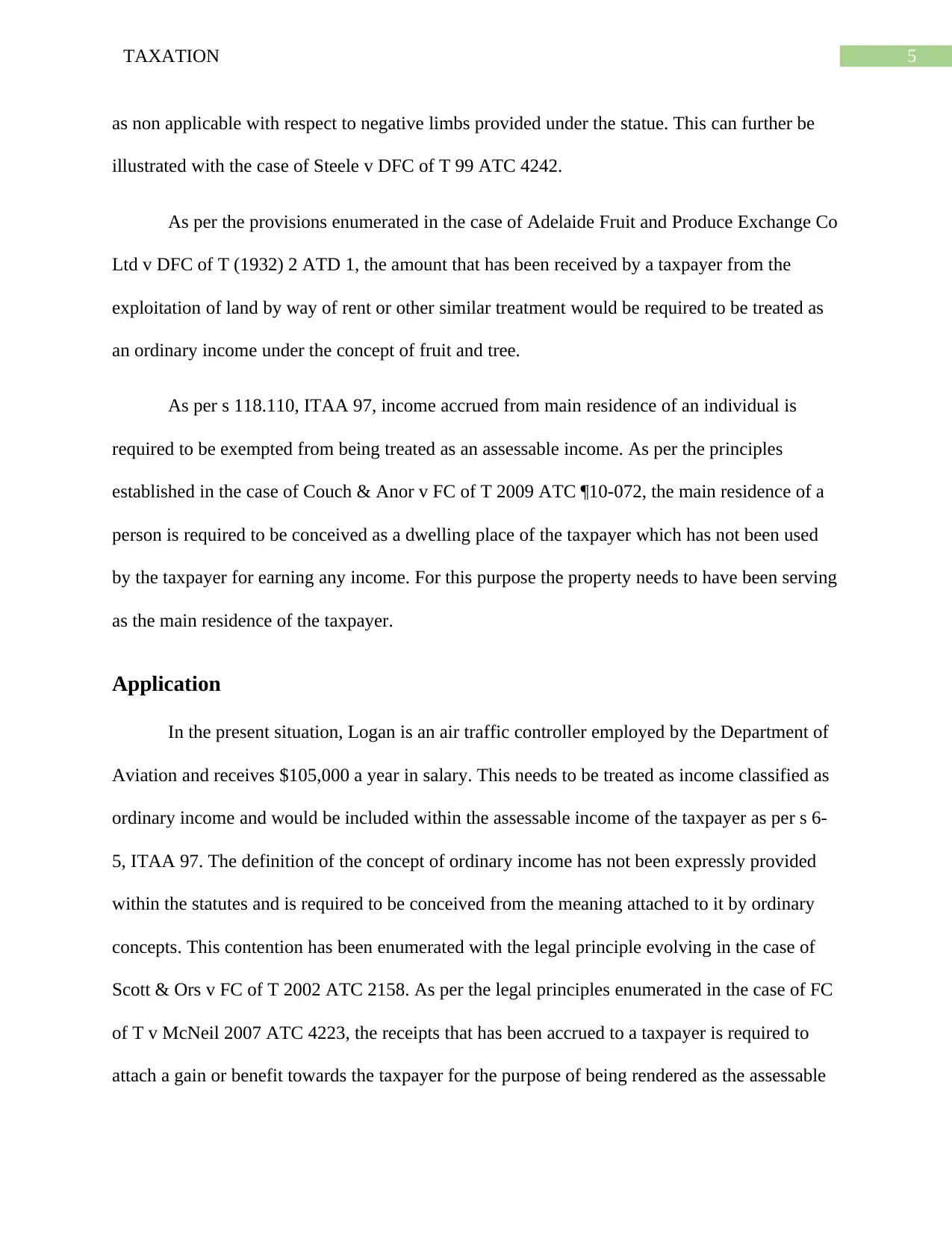
5TAXATION
as non applicable with respect to negative limbs provided under the statue. This can further be
illustrated with the case of Steele v DFC of T 99 ATC 4242.
As per the provisions enumerated in the case of Adelaide Fruit and Produce Exchange Co
Ltd v DFC of T (1932) 2 ATD 1, the amount that has been received by a taxpayer from the
exploitation of land by way of rent or other similar treatment would be required to be treated as
an ordinary income under the concept of fruit and tree.
As per s 118.110, ITAA 97, income accrued from main residence of an individual is
required to be exempted from being treated as an assessable income. As per the principles
established in the case of Couch & Anor v FC of T 2009 ATC ¶10-072, the main residence of a
person is required to be conceived as a dwelling place of the taxpayer which has not been used
by the taxpayer for earning any income. For this purpose the property needs to have been serving
as the main residence of the taxpayer.
Application
In the present situation, Logan is an air traffic controller employed by the Department of
Aviation and receives $105,000 a year in salary. This needs to be treated as income classified as
ordinary income and would be included within the assessable income of the taxpayer as per s 6-
5, ITAA 97. The definition of the concept of ordinary income has not been expressly provided
within the statutes and is required to be conceived from the meaning attached to it by ordinary
concepts. This contention has been enumerated with the legal principle evolving in the case of
Scott & Ors v FC of T 2002 ATC 2158. As per the legal principles enumerated in the case of FC
of T v McNeil 2007 ATC 4223, the receipts that has been accrued to a taxpayer is required to
attach a gain or benefit towards the taxpayer for the purpose of being rendered as the assessable
as non applicable with respect to negative limbs provided under the statue. This can further be
illustrated with the case of Steele v DFC of T 99 ATC 4242.
As per the provisions enumerated in the case of Adelaide Fruit and Produce Exchange Co
Ltd v DFC of T (1932) 2 ATD 1, the amount that has been received by a taxpayer from the
exploitation of land by way of rent or other similar treatment would be required to be treated as
an ordinary income under the concept of fruit and tree.
As per s 118.110, ITAA 97, income accrued from main residence of an individual is
required to be exempted from being treated as an assessable income. As per the principles
established in the case of Couch & Anor v FC of T 2009 ATC ¶10-072, the main residence of a
person is required to be conceived as a dwelling place of the taxpayer which has not been used
by the taxpayer for earning any income. For this purpose the property needs to have been serving
as the main residence of the taxpayer.
Application
In the present situation, Logan is an air traffic controller employed by the Department of
Aviation and receives $105,000 a year in salary. This needs to be treated as income classified as
ordinary income and would be included within the assessable income of the taxpayer as per s 6-
5, ITAA 97. The definition of the concept of ordinary income has not been expressly provided
within the statutes and is required to be conceived from the meaning attached to it by ordinary
concepts. This contention has been enumerated with the legal principle evolving in the case of
Scott & Ors v FC of T 2002 ATC 2158. As per the legal principles enumerated in the case of FC
of T v McNeil 2007 ATC 4223, the receipts that has been accrued to a taxpayer is required to
attach a gain or benefit towards the taxpayer for the purpose of being rendered as the assessable
⊘ This is a preview!⊘
Do you want full access?
Subscribe today to unlock all pages.

Trusted by 1+ million students worldwide
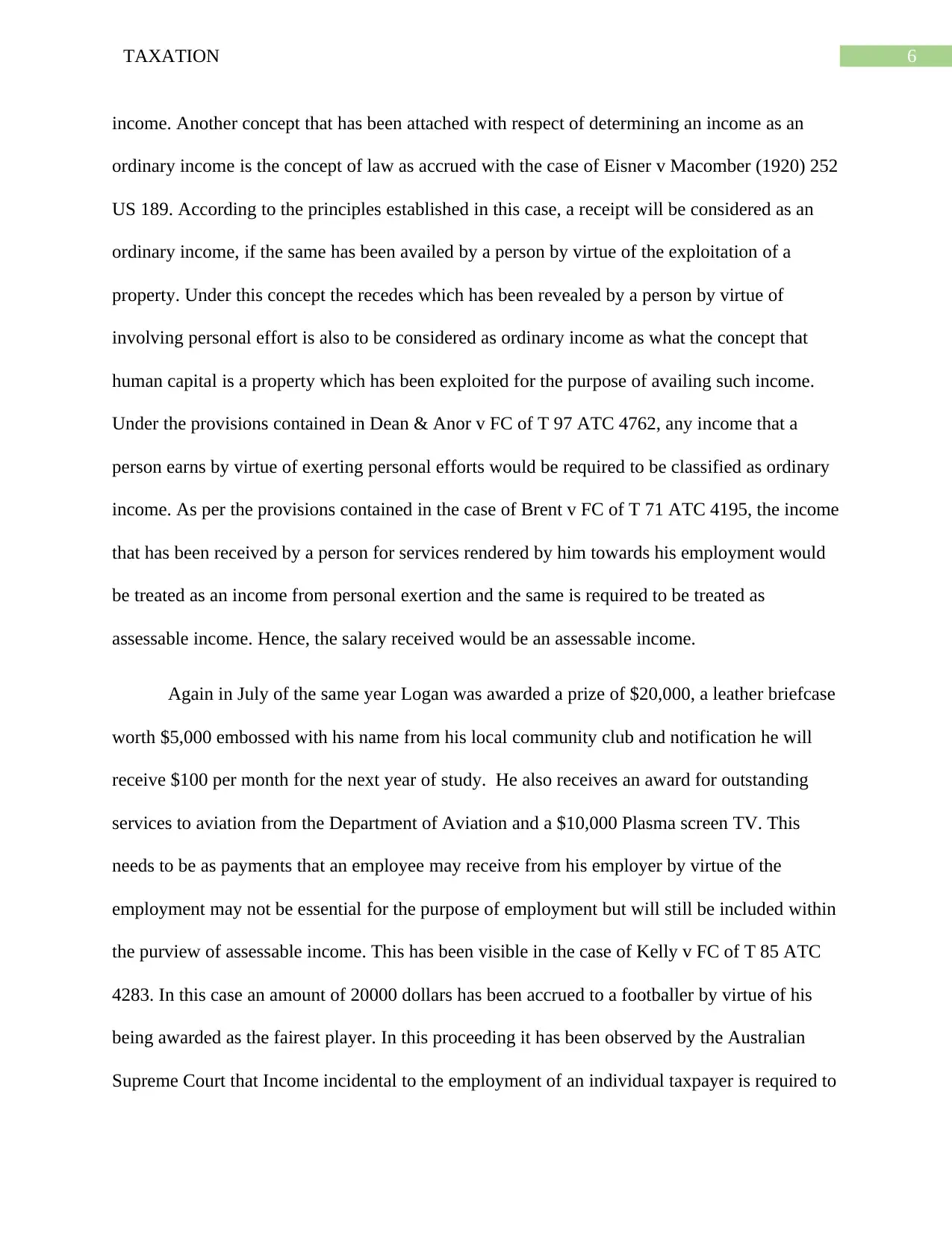
6TAXATION
income. Another concept that has been attached with respect of determining an income as an
ordinary income is the concept of law as accrued with the case of Eisner v Macomber (1920) 252
US 189. According to the principles established in this case, a receipt will be considered as an
ordinary income, if the same has been availed by a person by virtue of the exploitation of a
property. Under this concept the recedes which has been revealed by a person by virtue of
involving personal effort is also to be considered as ordinary income as what the concept that
human capital is a property which has been exploited for the purpose of availing such income.
Under the provisions contained in Dean & Anor v FC of T 97 ATC 4762, any income that a
person earns by virtue of exerting personal efforts would be required to be classified as ordinary
income. As per the provisions contained in the case of Brent v FC of T 71 ATC 4195, the income
that has been received by a person for services rendered by him towards his employment would
be treated as an income from personal exertion and the same is required to be treated as
assessable income. Hence, the salary received would be an assessable income.
Again in July of the same year Logan was awarded a prize of $20,000, a leather briefcase
worth $5,000 embossed with his name from his local community club and notification he will
receive $100 per month for the next year of study. He also receives an award for outstanding
services to aviation from the Department of Aviation and a $10,000 Plasma screen TV. This
needs to be as payments that an employee may receive from his employer by virtue of the
employment may not be essential for the purpose of employment but will still be included within
the purview of assessable income. This has been visible in the case of Kelly v FC of T 85 ATC
4283. In this case an amount of 20000 dollars has been accrued to a footballer by virtue of his
being awarded as the fairest player. In this proceeding it has been observed by the Australian
Supreme Court that Income incidental to the employment of an individual taxpayer is required to
income. Another concept that has been attached with respect of determining an income as an
ordinary income is the concept of law as accrued with the case of Eisner v Macomber (1920) 252
US 189. According to the principles established in this case, a receipt will be considered as an
ordinary income, if the same has been availed by a person by virtue of the exploitation of a
property. Under this concept the recedes which has been revealed by a person by virtue of
involving personal effort is also to be considered as ordinary income as what the concept that
human capital is a property which has been exploited for the purpose of availing such income.
Under the provisions contained in Dean & Anor v FC of T 97 ATC 4762, any income that a
person earns by virtue of exerting personal efforts would be required to be classified as ordinary
income. As per the provisions contained in the case of Brent v FC of T 71 ATC 4195, the income
that has been received by a person for services rendered by him towards his employment would
be treated as an income from personal exertion and the same is required to be treated as
assessable income. Hence, the salary received would be an assessable income.
Again in July of the same year Logan was awarded a prize of $20,000, a leather briefcase
worth $5,000 embossed with his name from his local community club and notification he will
receive $100 per month for the next year of study. He also receives an award for outstanding
services to aviation from the Department of Aviation and a $10,000 Plasma screen TV. This
needs to be as payments that an employee may receive from his employer by virtue of the
employment may not be essential for the purpose of employment but will still be included within
the purview of assessable income. This has been visible in the case of Kelly v FC of T 85 ATC
4283. In this case an amount of 20000 dollars has been accrued to a footballer by virtue of his
being awarded as the fairest player. In this proceeding it has been observed by the Australian
Supreme Court that Income incidental to the employment of an individual taxpayer is required to
Paraphrase This Document
Need a fresh take? Get an instant paraphrase of this document with our AI Paraphraser
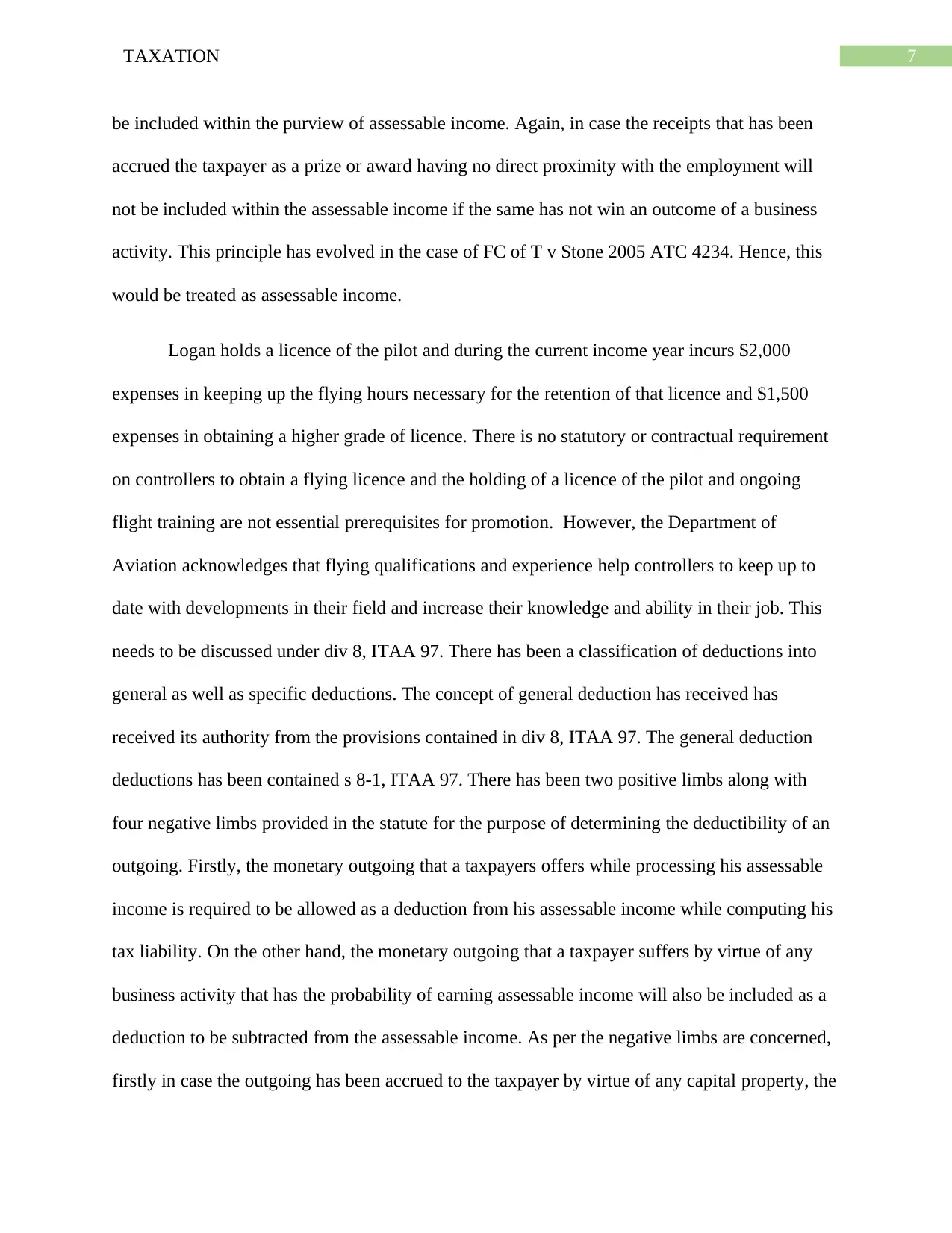
7TAXATION
be included within the purview of assessable income. Again, in case the receipts that has been
accrued the taxpayer as a prize or award having no direct proximity with the employment will
not be included within the assessable income if the same has not win an outcome of a business
activity. This principle has evolved in the case of FC of T v Stone 2005 ATC 4234. Hence, this
would be treated as assessable income.
Logan holds a licence of the pilot and during the current income year incurs $2,000
expenses in keeping up the flying hours necessary for the retention of that licence and $1,500
expenses in obtaining a higher grade of licence. There is no statutory or contractual requirement
on controllers to obtain a flying licence and the holding of a licence of the pilot and ongoing
flight training are not essential prerequisites for promotion. However, the Department of
Aviation acknowledges that flying qualifications and experience help controllers to keep up to
date with developments in their field and increase their knowledge and ability in their job. This
needs to be discussed under div 8, ITAA 97. There has been a classification of deductions into
general as well as specific deductions. The concept of general deduction has received has
received its authority from the provisions contained in div 8, ITAA 97. The general deduction
deductions has been contained s 8-1, ITAA 97. There has been two positive limbs along with
four negative limbs provided in the statute for the purpose of determining the deductibility of an
outgoing. Firstly, the monetary outgoing that a taxpayers offers while processing his assessable
income is required to be allowed as a deduction from his assessable income while computing his
tax liability. On the other hand, the monetary outgoing that a taxpayer suffers by virtue of any
business activity that has the probability of earning assessable income will also be included as a
deduction to be subtracted from the assessable income. As per the negative limbs are concerned,
firstly in case the outgoing has been accrued to the taxpayer by virtue of any capital property, the
be included within the purview of assessable income. Again, in case the receipts that has been
accrued the taxpayer as a prize or award having no direct proximity with the employment will
not be included within the assessable income if the same has not win an outcome of a business
activity. This principle has evolved in the case of FC of T v Stone 2005 ATC 4234. Hence, this
would be treated as assessable income.
Logan holds a licence of the pilot and during the current income year incurs $2,000
expenses in keeping up the flying hours necessary for the retention of that licence and $1,500
expenses in obtaining a higher grade of licence. There is no statutory or contractual requirement
on controllers to obtain a flying licence and the holding of a licence of the pilot and ongoing
flight training are not essential prerequisites for promotion. However, the Department of
Aviation acknowledges that flying qualifications and experience help controllers to keep up to
date with developments in their field and increase their knowledge and ability in their job. This
needs to be discussed under div 8, ITAA 97. There has been a classification of deductions into
general as well as specific deductions. The concept of general deduction has received has
received its authority from the provisions contained in div 8, ITAA 97. The general deduction
deductions has been contained s 8-1, ITAA 97. There has been two positive limbs along with
four negative limbs provided in the statute for the purpose of determining the deductibility of an
outgoing. Firstly, the monetary outgoing that a taxpayers offers while processing his assessable
income is required to be allowed as a deduction from his assessable income while computing his
tax liability. On the other hand, the monetary outgoing that a taxpayer suffers by virtue of any
business activity that has the probability of earning assessable income will also be included as a
deduction to be subtracted from the assessable income. As per the negative limbs are concerned,
firstly in case the outgoing has been accrued to the taxpayer by virtue of any capital property, the
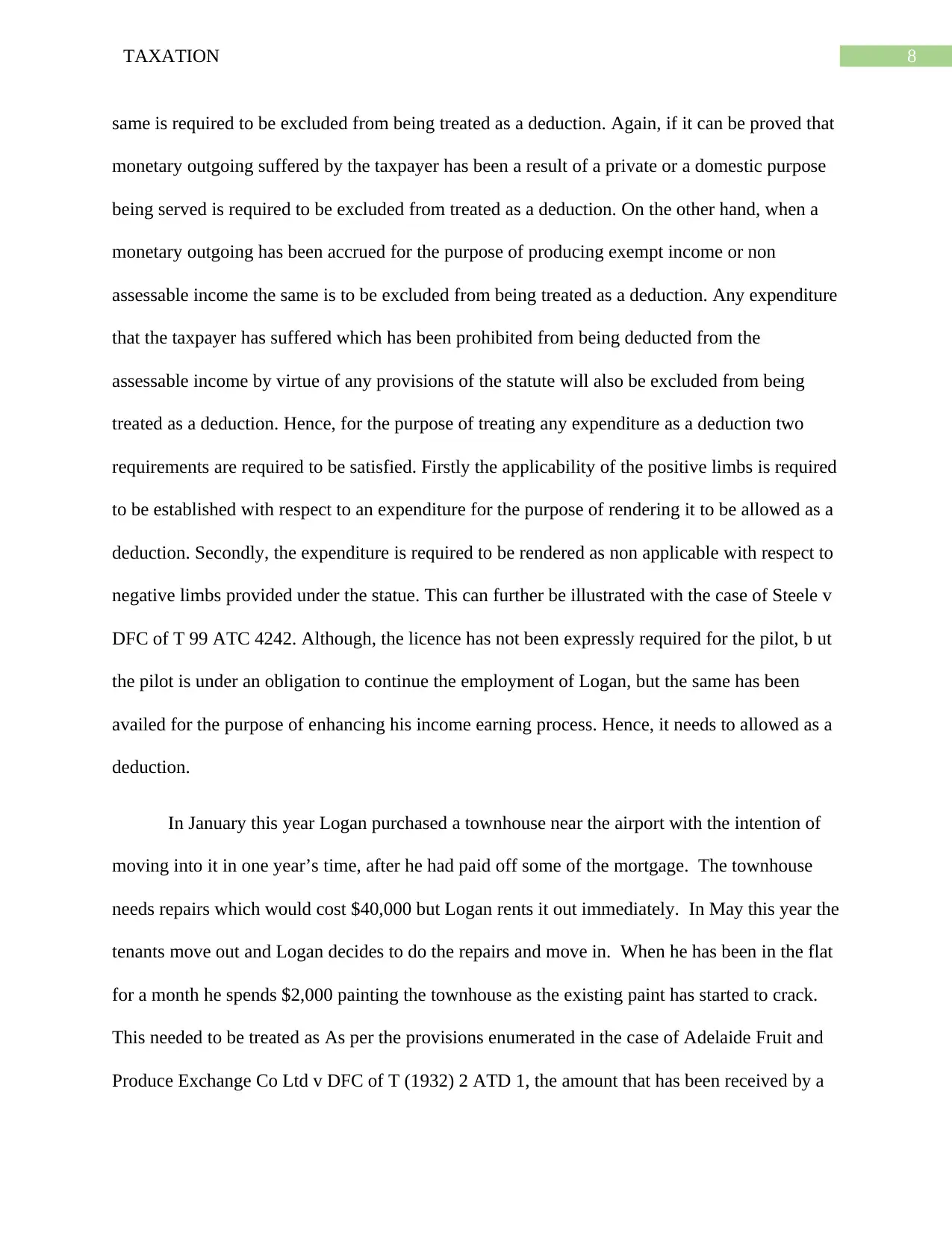
8TAXATION
same is required to be excluded from being treated as a deduction. Again, if it can be proved that
monetary outgoing suffered by the taxpayer has been a result of a private or a domestic purpose
being served is required to be excluded from treated as a deduction. On the other hand, when a
monetary outgoing has been accrued for the purpose of producing exempt income or non
assessable income the same is to be excluded from being treated as a deduction. Any expenditure
that the taxpayer has suffered which has been prohibited from being deducted from the
assessable income by virtue of any provisions of the statute will also be excluded from being
treated as a deduction. Hence, for the purpose of treating any expenditure as a deduction two
requirements are required to be satisfied. Firstly the applicability of the positive limbs is required
to be established with respect to an expenditure for the purpose of rendering it to be allowed as a
deduction. Secondly, the expenditure is required to be rendered as non applicable with respect to
negative limbs provided under the statue. This can further be illustrated with the case of Steele v
DFC of T 99 ATC 4242. Although, the licence has not been expressly required for the pilot, b ut
the pilot is under an obligation to continue the employment of Logan, but the same has been
availed for the purpose of enhancing his income earning process. Hence, it needs to allowed as a
deduction.
In January this year Logan purchased a townhouse near the airport with the intention of
moving into it in one year’s time, after he had paid off some of the mortgage. The townhouse
needs repairs which would cost $40,000 but Logan rents it out immediately. In May this year the
tenants move out and Logan decides to do the repairs and move in. When he has been in the flat
for a month he spends $2,000 painting the townhouse as the existing paint has started to crack.
This needed to be treated as As per the provisions enumerated in the case of Adelaide Fruit and
Produce Exchange Co Ltd v DFC of T (1932) 2 ATD 1, the amount that has been received by a
same is required to be excluded from being treated as a deduction. Again, if it can be proved that
monetary outgoing suffered by the taxpayer has been a result of a private or a domestic purpose
being served is required to be excluded from treated as a deduction. On the other hand, when a
monetary outgoing has been accrued for the purpose of producing exempt income or non
assessable income the same is to be excluded from being treated as a deduction. Any expenditure
that the taxpayer has suffered which has been prohibited from being deducted from the
assessable income by virtue of any provisions of the statute will also be excluded from being
treated as a deduction. Hence, for the purpose of treating any expenditure as a deduction two
requirements are required to be satisfied. Firstly the applicability of the positive limbs is required
to be established with respect to an expenditure for the purpose of rendering it to be allowed as a
deduction. Secondly, the expenditure is required to be rendered as non applicable with respect to
negative limbs provided under the statue. This can further be illustrated with the case of Steele v
DFC of T 99 ATC 4242. Although, the licence has not been expressly required for the pilot, b ut
the pilot is under an obligation to continue the employment of Logan, but the same has been
availed for the purpose of enhancing his income earning process. Hence, it needs to allowed as a
deduction.
In January this year Logan purchased a townhouse near the airport with the intention of
moving into it in one year’s time, after he had paid off some of the mortgage. The townhouse
needs repairs which would cost $40,000 but Logan rents it out immediately. In May this year the
tenants move out and Logan decides to do the repairs and move in. When he has been in the flat
for a month he spends $2,000 painting the townhouse as the existing paint has started to crack.
This needed to be treated as As per the provisions enumerated in the case of Adelaide Fruit and
Produce Exchange Co Ltd v DFC of T (1932) 2 ATD 1, the amount that has been received by a
⊘ This is a preview!⊘
Do you want full access?
Subscribe today to unlock all pages.

Trusted by 1+ million students worldwide
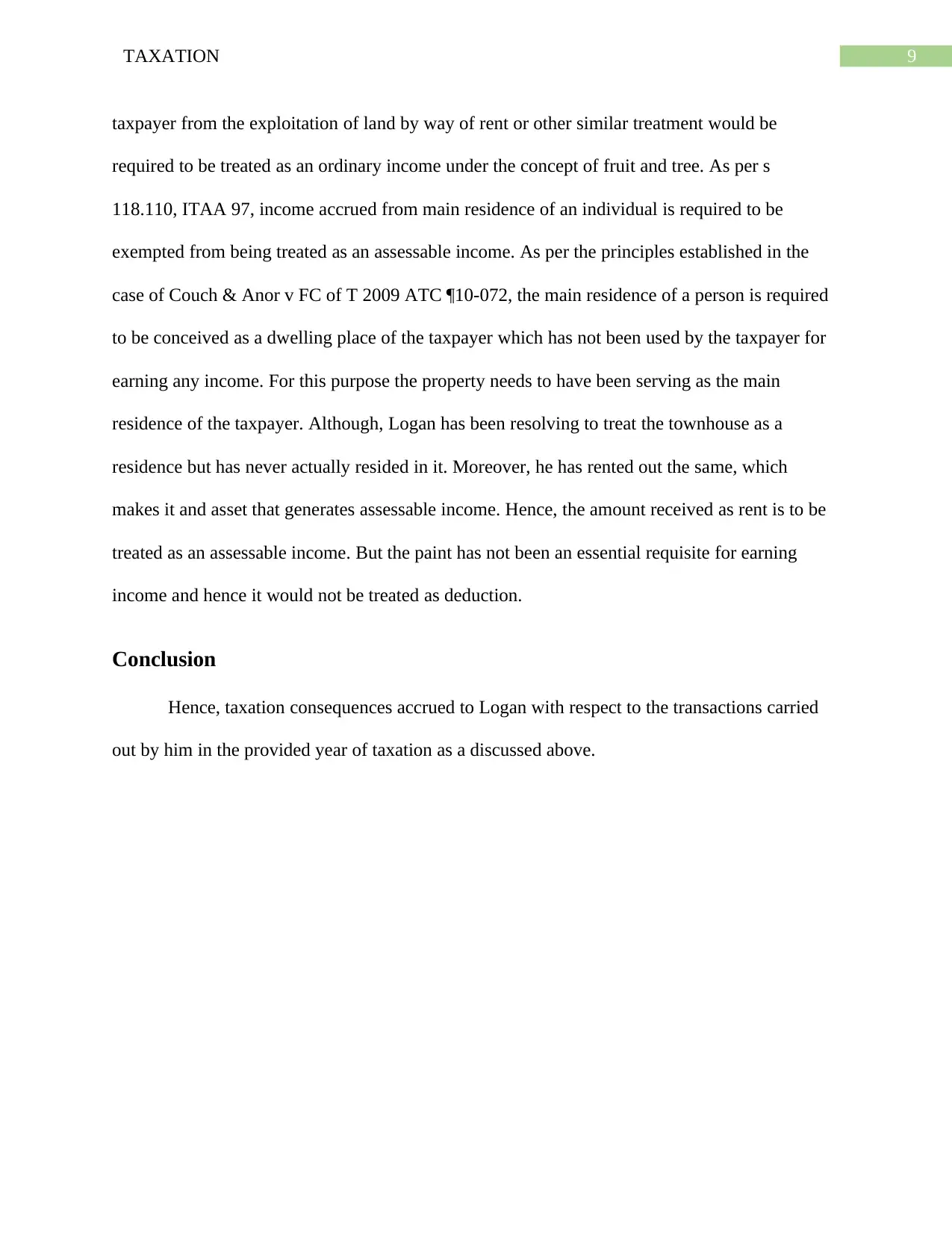
9TAXATION
taxpayer from the exploitation of land by way of rent or other similar treatment would be
required to be treated as an ordinary income under the concept of fruit and tree. As per s
118.110, ITAA 97, income accrued from main residence of an individual is required to be
exempted from being treated as an assessable income. As per the principles established in the
case of Couch & Anor v FC of T 2009 ATC ¶10-072, the main residence of a person is required
to be conceived as a dwelling place of the taxpayer which has not been used by the taxpayer for
earning any income. For this purpose the property needs to have been serving as the main
residence of the taxpayer. Although, Logan has been resolving to treat the townhouse as a
residence but has never actually resided in it. Moreover, he has rented out the same, which
makes it and asset that generates assessable income. Hence, the amount received as rent is to be
treated as an assessable income. But the paint has not been an essential requisite for earning
income and hence it would not be treated as deduction.
Conclusion
Hence, taxation consequences accrued to Logan with respect to the transactions carried
out by him in the provided year of taxation as a discussed above.
taxpayer from the exploitation of land by way of rent or other similar treatment would be
required to be treated as an ordinary income under the concept of fruit and tree. As per s
118.110, ITAA 97, income accrued from main residence of an individual is required to be
exempted from being treated as an assessable income. As per the principles established in the
case of Couch & Anor v FC of T 2009 ATC ¶10-072, the main residence of a person is required
to be conceived as a dwelling place of the taxpayer which has not been used by the taxpayer for
earning any income. For this purpose the property needs to have been serving as the main
residence of the taxpayer. Although, Logan has been resolving to treat the townhouse as a
residence but has never actually resided in it. Moreover, he has rented out the same, which
makes it and asset that generates assessable income. Hence, the amount received as rent is to be
treated as an assessable income. But the paint has not been an essential requisite for earning
income and hence it would not be treated as deduction.
Conclusion
Hence, taxation consequences accrued to Logan with respect to the transactions carried
out by him in the provided year of taxation as a discussed above.
Paraphrase This Document
Need a fresh take? Get an instant paraphrase of this document with our AI Paraphraser
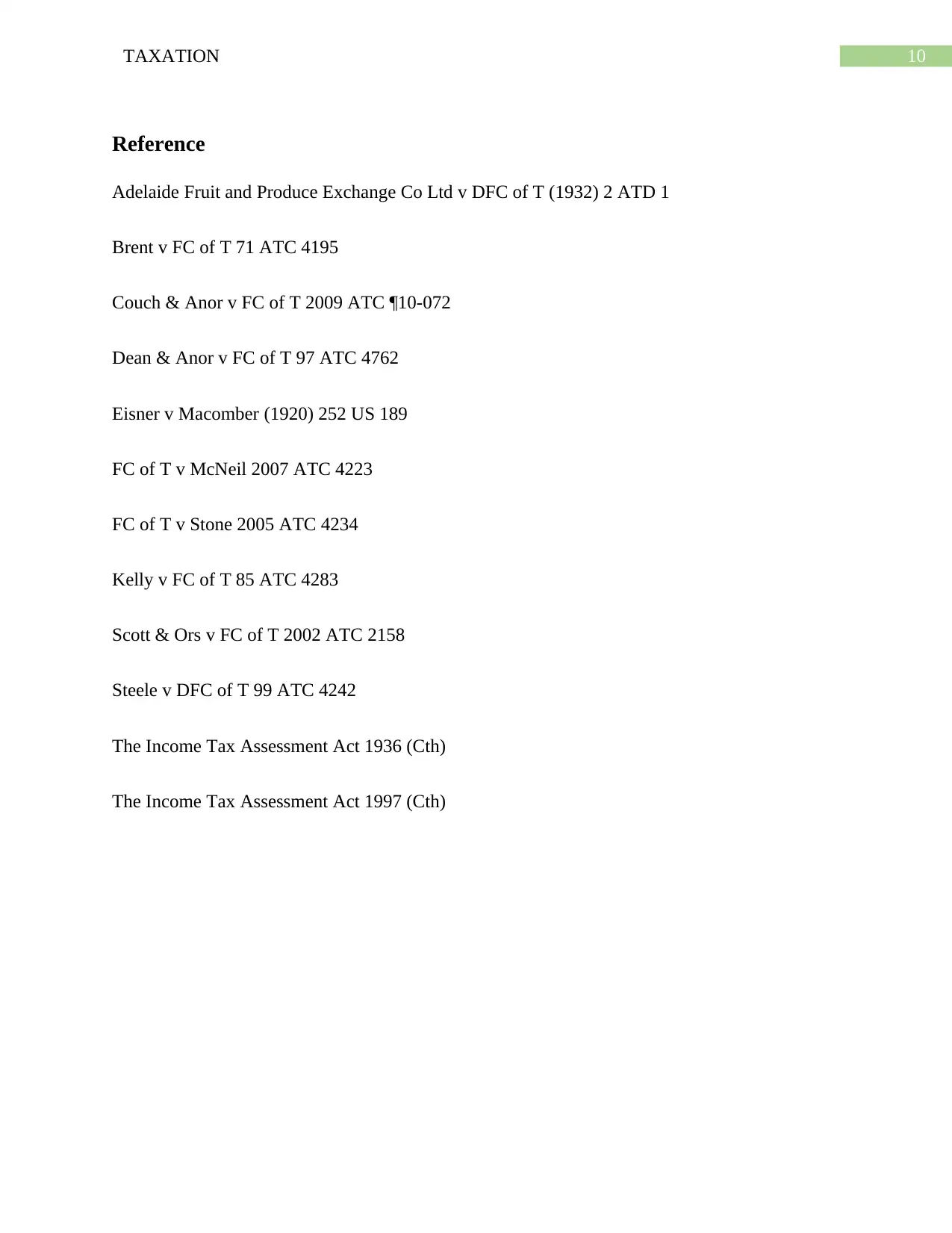
10TAXATION
Reference
Adelaide Fruit and Produce Exchange Co Ltd v DFC of T (1932) 2 ATD 1
Brent v FC of T 71 ATC 4195
Couch & Anor v FC of T 2009 ATC ¶10-072
Dean & Anor v FC of T 97 ATC 4762
Eisner v Macomber (1920) 252 US 189
FC of T v McNeil 2007 ATC 4223
FC of T v Stone 2005 ATC 4234
Kelly v FC of T 85 ATC 4283
Scott & Ors v FC of T 2002 ATC 2158
Steele v DFC of T 99 ATC 4242
The Income Tax Assessment Act 1936 (Cth)
The Income Tax Assessment Act 1997 (Cth)
Reference
Adelaide Fruit and Produce Exchange Co Ltd v DFC of T (1932) 2 ATD 1
Brent v FC of T 71 ATC 4195
Couch & Anor v FC of T 2009 ATC ¶10-072
Dean & Anor v FC of T 97 ATC 4762
Eisner v Macomber (1920) 252 US 189
FC of T v McNeil 2007 ATC 4223
FC of T v Stone 2005 ATC 4234
Kelly v FC of T 85 ATC 4283
Scott & Ors v FC of T 2002 ATC 2158
Steele v DFC of T 99 ATC 4242
The Income Tax Assessment Act 1936 (Cth)
The Income Tax Assessment Act 1997 (Cth)
1 out of 11
Related Documents
Your All-in-One AI-Powered Toolkit for Academic Success.
+13062052269
info@desklib.com
Available 24*7 on WhatsApp / Email
![[object Object]](/_next/static/media/star-bottom.7253800d.svg)
Unlock your academic potential
Copyright © 2020–2026 A2Z Services. All Rights Reserved. Developed and managed by ZUCOL.




